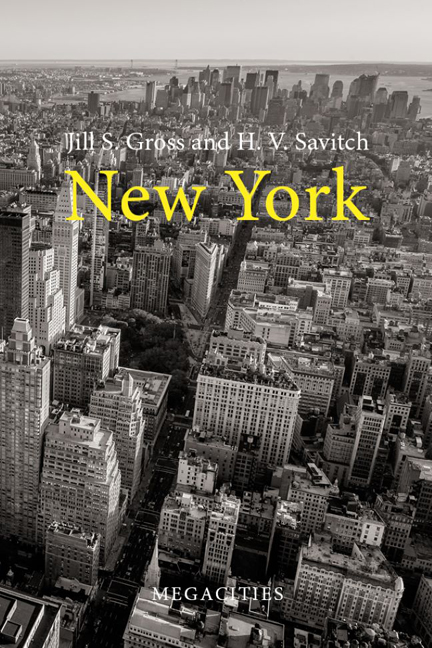Book contents
- Frontmatter
- Contents
- Preface and acknowledgements
- 1 Introduction: New York as a megacity
- 2 Crises, breakdowns and New York’s endurance
- 3 Building a global megacity: corporate- centred urban development and leadership
- 4 Expanded governance in the megacity
- 5 Neighbourhoods, diversification and gentrification in the megacity
- 6 Globalization in the megacity
- 7 Conclusions
- References
- Index
2 - Crises, breakdowns and New York’s endurance
Published online by Cambridge University Press: 20 January 2024
- Frontmatter
- Contents
- Preface and acknowledgements
- 1 Introduction: New York as a megacity
- 2 Crises, breakdowns and New York’s endurance
- 3 Building a global megacity: corporate- centred urban development and leadership
- 4 Expanded governance in the megacity
- 5 Neighbourhoods, diversification and gentrification in the megacity
- 6 Globalization in the megacity
- 7 Conclusions
- References
- Index
Summary
Understanding crises and breakdowns
Sooner or later megacities face a crisis that threatens their well- being or even their survival – either through natural or human- made dangers. By crisis we mean a major problem or challenge to the core principles of a system. Crises derive from different sources and come in different forms. Like most “emergencies” they are unexpected, creeping up on a city by an uncommon, gradual intersection of events or by an abrupt, shocking strike. We categorize these crisis as: (1) natural (2) politico/violent (3) eco/fiscal and (4) techno/infrastructures. Examples of natural crises include weather disasters and widespread diseases. Politico/violent crises include serious challenges to the existing structure of power. Political crises need not necessarily be violent, but merely serve to threaten existing power. In 1971 the state of New York interposed its authority over the city because of endemic police corruption and conducted the Knapp Hearings, which questioned the legitimacy of existing local government. Other political/violent crises did end in violence, such as the Newark riot of 1967 and civil disruptions in northern New Jersey and New York City in the wake of Martin Luther King's assassination during1968. Eco/fiscal crises pertain to commercial upheavals and revenue breakdowns, the most notorious occurring in 1975– 76 and 2007– 08. Finally, techno/infrastructure crises pertain to the physical breakdown of the region's electric grid, transportation corridors or water resources. A prime example of the latter includes the region's largest electric blackout during the summer of 1977, which left nine million people without power and another more limited blackout at its 42nd- year anniversary.
Crises yield political consequences. They can create conditions for realigning the electorate and bring new political coalitions into power. The politics of crises also produces a “crisis manager”. Success or failure can make or break the career of public figures. Politicians assign blame for their cause and take credit for their resolution. Chances are the more politicians urge that we keep “politics out of a crisis” the greater the chance that politics will enter the fray, especially as the crisis is resolved.
- Type
- Chapter
- Information
- New York , pp. 27 - 56Publisher: Agenda PublishingPrint publication year: 2023



